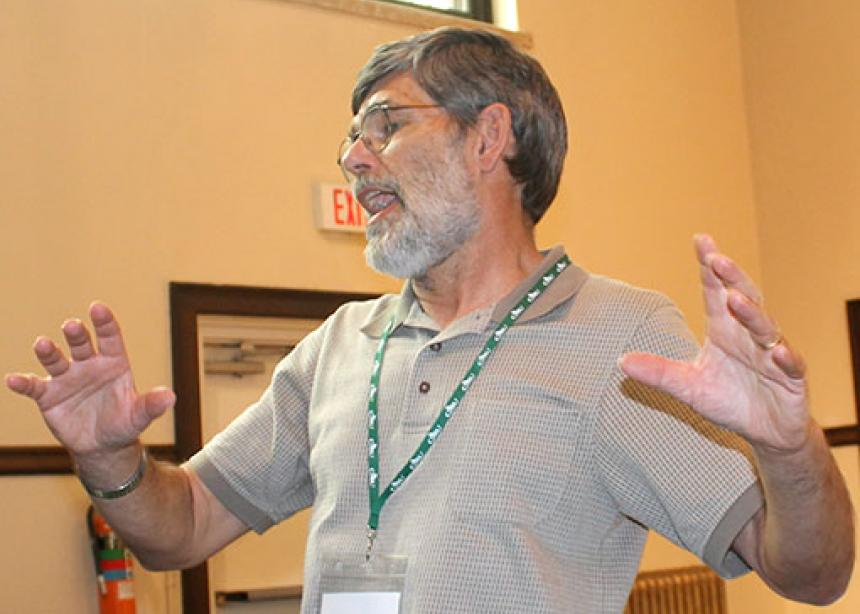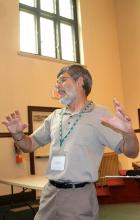Where in the Bible can Christians turn to for “wild hope” if they are to have faith in an unknown season?
That was the question Dan Epp-Tiessen, associate professor of Bible at Canadian Mennonite University in Winnipeg, addressed during the seminar he led at Assembly 2014 on July 4. In the seminar, entitled “Wild hope: Living in light of God’s good future,” he highlighted biblical visions of God’s good future.
“In my own personal life, in my own faith pilgrimage, I’m finding just more and more strength and hope in God’s good future,” he said. “More and more I find I’m challenged and inspired by these biblical visions.”
“I’m struck by the contrast between what we see in Paul and the New Testament, and many of our congregations,” he added. “We don’t talk about that ‘wild hope,’ or at least the congregations that nurtured me [didn’t]. . . . We shy away from that stuff.”
Epp-Tiessen pointed to stories in Genesis 12 in which God begins to work through Abraham to redeem the Israelite people, as well as stories in Isaiah, the Psalms and the New Testament, stories in which God begins the work of renewing human community, healing creation and setting it free from bondage and decay.
The fundamental promise of Jesus is that the kingdom of God is near, Epp-Tiessen pointed out. The world is in a state of “already, not yet,” he said, because it has been given an idea of what the kingdom will be like as a result of the life and work of Jesus. Eventually, there will come a time when all of creation will be restored.
Epp-Tiessen pointed out that, while the dominant rapture narrative in popular Christian culture is that Jesus will come again and whisk Christians away to a different place, the Book of Revelation offers “wild hope” in the form of a reversal.
“God comes down to share this world and live in our midst, and God’s holy city comes down and creation is healed and redeemed,” he said, adding, “All the evil forces are eliminated.”
God’s good future will come in God’s time, he said. This future should inspire the lives of Christians. Ultimately, what Christians do on Earth matters.
He pointed to I Corinthians 15:58, where Paul writes, “Therefore, my dear brothers and sisters, stand firm. Let nothing move you. Always give yourselves fully to the work of the Lord, because you know that your labour in the Lord is not in vain.”
“God has an agenda for God’s creation, and God expects us to get on board with that agenda,” he said. “All our small efforts to help our neighbours, to help feed the hungry in the world . . . somehow God is going to take our efforts and resurrect them and do something marvellous with them.”
“Because of God’s good future, what we do with these bodies here and now matters,” he concluded. “Your labour is not in vain.”
Rudy Franz, a pastor from Blumenort, Man., said he appreciated the seminar because the cultural context North Americans find themselves in does not always offer much hope. The news media typically shows North Americans that which is not working in the world, Franz said, and when people focus on what is not working, it tends to be all they see. Contrasting that with a biblical message is important.
“It helps to set our lives and cultural context in perspective,” Franz said of the seminar. “Our lives are part of a bigger story of God [working] in the world, and we ought not forget that.”
To see links to more Assembly content, go to Stories and images of Assembly 2014.



Add new comment
Canadian Mennonite invites comments and encourages constructive discussion about our content. Actual full names (first and last) are required. Comments are moderated and may be edited. They will not appear online until approved and will be posted during business hours. Some comments may be reproduced in print.